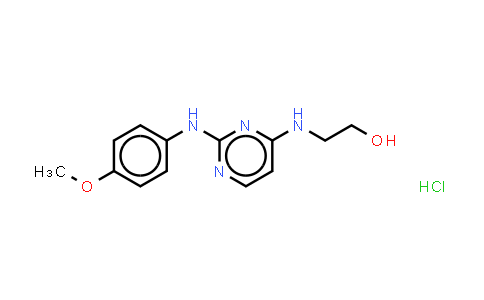
Cardiogenol C (hydrochloride) NLT 98%
SKU : MC504187
CAS Number : 1049741-55-0
Molecular Formula : C13H17ClN4O2 | Molecular Weight : 296.75
Quote Request| Purity | NLT 98% |
|---|---|
| Storage | at 20ºC 2 years |
* The above information is for reference only.
* If the product has intellectual property rights, a license granted is must or contact us.
| Chemical Name | Cardiogenol C (hydrochloride) |
|---|---|
| CAS Number | 1049741-55-0 |
| MDL Number | MFCD06798334 |
| Molecular Formula | C13H17ClN4O2 |
| Molecular Weight | 296.75 |
Cardiogenol C hydrochloride is a potent cell-permeable pyrimidine inducer which prompts the differentiation of ESCs into cardiomyocytes (EC50=100 nM)[1]. Cardiogenol C hydrochloride also acts cardiomyogenic on already lineage-committed progenitor cell types with a limited degree of plasticity. Cardiogenol C hydrochloride is a useful cardiomyogenic agent and can be used as a tool to improve cardiac repair by cell transplantation therapy in animal models[2]. IC50 & Target: EC50: 100 nM (differentiation of ESCs into cardiomyocytes)[1] In Vitro: Cardiogenol C hydrochloride (1 μM; 7 days) has a cardiomyogenic effect on P19 cells, it significantly increases atrial natriuretic factor (ANF, nppa) in P19 cells when it compares to untreated control cells[1].
Cardiogenol C hydrochloride (0.01-100 μM; 7 days) significantly increases ANF expression. In addition, another frequently used cardiac marker gene (NKX2-5) is also significantly increased by this small molecule in C2C12 cells[2].
Cardiogenol C hydrochloride (0.001-100 μM; 7 days) increases cardiac Nav1.5 sodium channel protein expression as dose-dependent manner in C2C12 cells[2].
Cardiogenol C hydrochloride (1 μM; 35 days) addition from day 0 significantly increases myocardial differentiation and results in a significantly increased percentage of CBs with beating cardiomyocytes. This small moleculepromotes the development of beating cardiomyocytes in cardiovascular progenitor cell-derived cardiac bodies[2].
Cardiogenol C hydrochloride (0.01-100 μM; 7 days) does not effect cell growth even at 10 μM. In addition, Cardiogenol C either solves in water or DMSO generates a similar effect. The highest concentration, 100 μM has significant cellular toxicity on C2C12 cells[2].
Related Products
© Copyright 2015-2024 Hangzhou MolCore BioPharmatech Co.,Ltd. All rights reserved.
